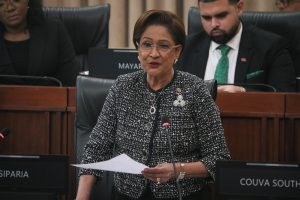By Sue-Ann Wayow
GOVERNMENT revenue from oil and gas has dropped drastically, declining by 54% for the period 2019 to 2020.
This was due to royalties declining by 46% from $3.4 billion in 2019 to $1.7 billion in 2020 revealed Minister of Energy and Energy Industries Stuart Young.
Young was speaking at the virtual launch of the Trinidad and Tobago Extractive Industries Transparency Initiative (TTEITI), State of the Extractive Sectors Report 2021 on Friday. It was the EITI seventh such report.
Giving information from 2018, Young said the biggest payments made to Government came from just under ten companies with the National Gas Company (NGC) being the country’s biggest revenue earner.

Young said, “In 2018, for the 5th year running NGC is the largest taxpayer, contributing $2.055 billion to Government revenue. They are followed by the BPTT with payments of $1.675 billion and EOG Resources with payments of $1.050 billion. In 2018, Shell paid $656 million while Perenco paid $654 million, Petrotrin paid $489 million and closing out the leading contributors, BHP paid $387 million.”
The TTEITI Steering Committee agreed to include unaudited or unreconciled information for fiscal 2019 and 2020 in this report despite the reconciliation being for 2018 in order to have the latest information, he said.

Young said, “In this report, for 2018, there was a small $24 million difference between what companies declared as paid and what Government declared as received and this can be attributed by the EITI Auditor/Administrator to foreign exchange differences and timing differences. This independent verification is very important, as in other countries their EITI reports reveal that millions have gone missing and can’t be accounted for. Thankfully, in T&T, we can account for any differences between company payments and Government receipts.”
Chair of the TTEITI Steering Committee Gregory McGuire said there was three areas of focus in moving forward. These include systematic disclosure and the moving away from one main report and a pilot project has been embarked on to be implemented by 2023, the mineral mining sector to stop the leakage of millions in revenue and legislative reform which would include mandatory reporting and allowing access to some Board of Inland Revenue (BIR) data.

Young who was previously Minister of National Security pledged to deal severely with illegal quarrying since it was robbing citizens of revenue and was a “ brutal dishonest attack.”
He said there was not much that government can do to increase revenue based on global oil prices but it can attempt to encourage increased production in the upstream sector for oil and gas.
He added that was one of the reasons why he wanted to clam down on illegal quarrying so that it can be more effective in its revenue earnings.
McGuire said the government was supporting a move towards hydrogen and hoped that the downstream promise was kept by more private sector and foreign investment.
Young also said that cross border gas was being discussed with key companies.
And the minister said that despite the decrease in statistical data, there was much hope for the future of the sector and government was committed to holding firm to the principles of transparency, frank dialogue and sharing data on our extractive sectors with citizens.
The full report can be viewed at https://reports.tteiti.com/state-extractive-sectors-report-2021/4/
![]()












